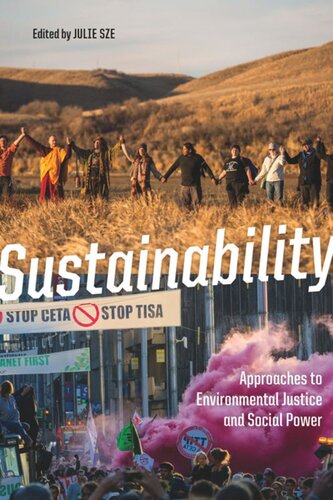

Most ebook files are in PDF format, so you can easily read them using various software such as Foxit Reader or directly on the Google Chrome browser.
Some ebook files are released by publishers in other formats such as .awz, .mobi, .epub, .fb2, etc. You may need to install specific software to read these formats on mobile/PC, such as Calibre.
Please read the tutorial at this link: https://ebookbell.com/faq
We offer FREE conversion to the popular formats you request; however, this may take some time. Therefore, right after payment, please email us, and we will try to provide the service as quickly as possible.
For some exceptional file formats or broken links (if any), please refrain from opening any disputes. Instead, email us first, and we will try to assist within a maximum of 6 hours.
EbookBell Team

4.8
84 reviewsA critical resource for approaching sustainability across the disciplines
Sustainability and social justice remain elusive even though each is unattainable without the other. Across the industrialized West and the Global South, unsustainable practices and social inequities exacerbate one another. How do social justice and sustainability connect? What does sustainability mean and, most importantly, how can we achieve it with justice?
This volume tackles these questions, placing social justice and interdisciplinary approaches at the center of efforts for a more sustainable world. Contributors present empirical case studies that illustrate how sustainability can take place without contributing to social inequality. From indigenous land rights, climate conflict, militarization and urban drought resilience, the book offers examples of ways in which sustainability and social justice strengthen one another. Through an understanding of history, diverse cultural traditions, and complexity in relation to race, class, and gender, this volume demonstrates ways in which sustainability can help to shape better and more robust solutions to the world’s most pressing problems.
Blending methods from the humanities, environmental sciences and the humanistic social sciences, this book offers an essential guide for the next generation of global citizens.
A critical resource for approaching sustainability across the disciplines
Sustainability and social justice remain elusive even though each is unattainable without the other. Across the industrialized West and the Global South, unsustainable practices and social inequities exacerbate one another. How do social justice and sustainability connect? What does sustainability mean and, most importantly, how can we achieve it with justice?
This volume tackles these questions, placing social justice and interdisciplinary approaches at the center of efforts for a more sustainable world. Contributors present empirical case studies that illustrate how sustainability can take place without contributing to social inequality. From indigenous land rights, climate conflict, militarization and urban drought resilience, the book offers examples of ways in which sustainability and social justice strengthen one another. Through an understanding of history, diverse cultural traditions, and complexity in relation to race, class, and gender, this volume demonstrates ways in which sustainability can help to shape better and more robust solutions to the world’s most pressing problems.
Blending methods from the humanities, environmental sciences and the humanistic social sciences, this book offers an essential guide for the next generation of global citizens.